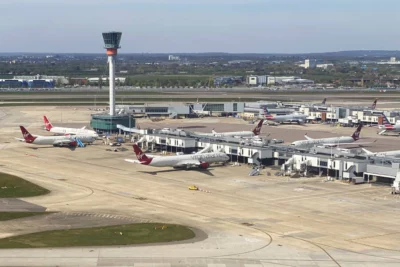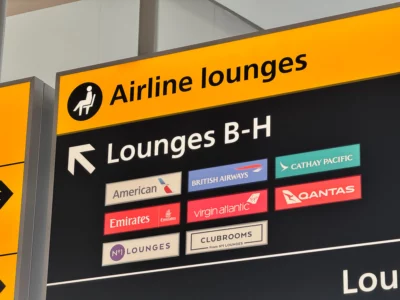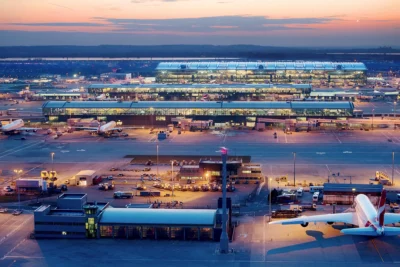Heathrow proposes £10 billion investment to increase passenger numbers by 10 million
Links on Head for Points may support the site by paying a commission. See here for all partner links.
2024 was a record-breaking year for Heathrow when it welcomed 83.9 million people – three million more than its previous record, set in 2019.
By 2031, it wants to be able to accommodate up to 94m passengers per year – an extra ten million. And it wants to do it without building any new terminal capacity.
Quite how it will do that – with no additional flights – remains to be seen. The only way capacity can increase is if airlines swap smaller planes out for larger ones or increase their overall load factor (the percentage each flight is full.)
With average load factors already high at many airlines (at BA it is 85.2%), and new aircraft taking years to arrive, it will likely fall short of this target.
The airport has just unveiled its proposal for the next five year investment plan, which is set to run from 2027 until 2031.
Heathrow says the £10 billion project “can be delivered affordably with stretching efficiency savings of over £800 million and an airport charge that remains lower than it was a decade ago in real terms.” Heathrow shareholders will make a £2 billion equity contribution.
However, it will still see an increase in passenger charges by 17% from what was/is paid from 2022-2026. The average charge for the next funding period would be £33.26 “in today’s prices” versus £28.46.
Because of the way Heathrow is funded, it must ask regulators (in this case the Civil Aviation Authority) for permission to do invest. The airlines will be able to make a counter-proposal with the CAA arbitrating the process.
So, what does £10 billion get you?
No new terminals, yet. Whilst Heathrow reconfirmed its plans to knock down the old Terminal 1 and extend Terminal 2 across its footprint (something that has been planned since Terminal 2 was built), work on that project is not set to start yet, not least because Heathrow needs to finish the new Terminal 2 baggage system before it can do so.
I am told that Heathrow will seek planning permission for those changes in this five year plan, allowing works to begin in the next period (2032-2036) if permission is secured.
The £10bn does not include any runway expansion, which is being treated as a separate project with a detailed proposal to come later this summer.
In the meantime, Heathrow will have to work with what it has, and that means:
“Creating 70,000m2 of new terminal space within our existing buildings by converting areas passengers don’t currently use.”
That’s the equivalent of ten football pitches and will enable the creation of new lounges in both T3 and T5 as part of the plan. New shops and restaurants are also touted.
Other targets include:
- 99% of bags travelling with passengers (up from 98.3% in 2024)
- 80% of flights departing on-time (up from 69% in 2024)
- 95% of passengers waiting less than five minutes at security (up from 92.6% in 2024)
Heathrow also wants to target “a step-change in service with more choice for passengers requiring additional support.” Just last month the CAA rated Heathrow’s current special assistance service provision as “needs improvement”; Edinburgh was the only other major airport in this category.
No such thing as a free lunch
To fund these improvements Heathrow wants to raise passenger charges by 17%, to an average of £33.26. According to the airport this is below what they were a decade ago “in real terms.”
Still, £10 billion sounds like a lot for what – based on the above – is a small amount of additional passenger space and some punctuality and service improvements.
I asked Heathrow how much of the £10 billion would be spent on the additional terminal space, but they were unable to provide a break down. In comparison:
- Gatwick Airport is spending just £140 million to build a brand new extension to Pier 6 that can accommodate eight aircraft gates and means 7.5 million additional passengers will be able to board via jetbridges each year.
- Manchester Airport’s big Terminal 2 project cost ‘just’ £1.3 billion. It doubled the size of the terminal and included a full refurbishment of the entire existing T2, due to reopen soon.
Heathrow’s two largest tenants, British Airways and Virgin Atlantic, agreed that (in Virgin’s words) “Heathrow needs to do better and dramatically improve the customer experience.”
Virgin Atlantic continued:
“Only Heathrow with its monopoly power as the UK’s only hub airport, would think that this £10bn investment plan represents value for money and that’s before any third runway expansion costs are factored into the equation.”
As with previous passenger charge disputes, Virgin called on the CAA to undertake a “fundamental review” of Heathrow’s funding model, which it called “simply not fit for purpose.”
That’s at least something the two can agree on, with Heathrow CEO Thomas Woldbye stating earlier this year that a third runway would require “making the regulatory model fit for purpose.”
Earlier this year, Heathrow’s biggest customers including the Heathrow Airline Operators’ Committee (AOC), Arora Group, British Airways owner International Airlines Group (IAG) and Virgin Atlantic launched ‘Heathrow Reimagined’, a campaign calling for a “better hub for Britain.” Proposals include breaking up ownership of the airport, with terminals to be operated by separate companies as is done at New York JFK.
Conclusion
What Heathrow has proposed is just that – a proposal. Ultimately, it is up to the CAA to decide how much the airport can reclaim and it will now hear feedback from airlines on the changes.






 Rob
Rob 





Comments (84)